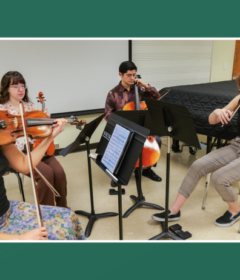Campus Vegetable Garden a Labor of Love for Students
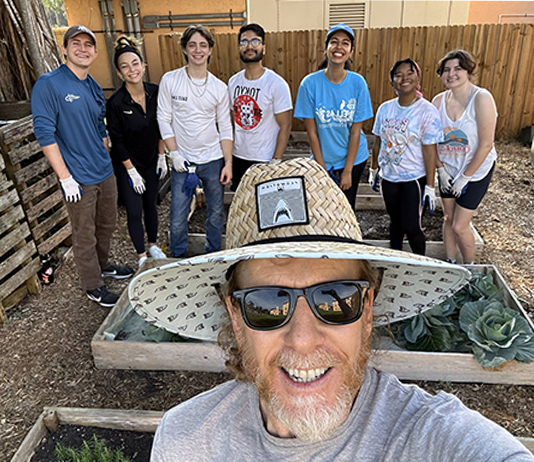
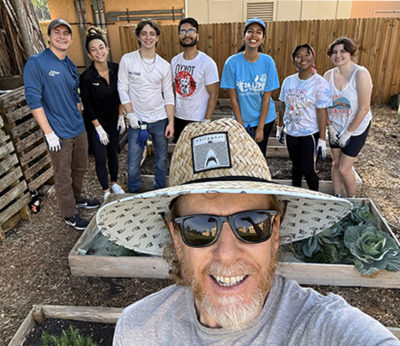
Obscured by trees along the north side of 15th Avenue South is a garden oasis where good things are growing.
A banyan-shaded green space yielding massive heads of organically grown cabbage and broccoli sprouts, is the result of a recently revived Stetson Food Law Society project.
“This year we have a beautiful garden and I am probably one of the biggest consumers of the crops,” said Law Professor Lance Long, the Food Law Society’s faculty advisor.
Reviving an old tradition
Long said the garden is the latest – and most successful – iteration of a student-run gardening initiative dating back about a decade. Then, a series of container gardens in Crummer Courtyard was productive, but it didn’t create a verdant, sanctuary-like space like the current garden initiative does. More recently, the current site of the project – just west of the Banyan Courtyard – had fallen into disrepair.
Fresh membership and a renewed sense of purpose inspired the Food Law Society to revive the project in the fall of 2021.
With help from the facilities department – which installed a hose and let the students use and store their tools in a nearby shed – the students began making true progress on the garden in Spring 2022 as part of an environmental law class. Through planning, meticulous work and a bit of trial-and-error, the space was thriving within six months.
Much of the labor is divided among Food Law Society President Iman Mamdouh, Vice President Jon Burton, and Treasurer Saad Chowdhury.
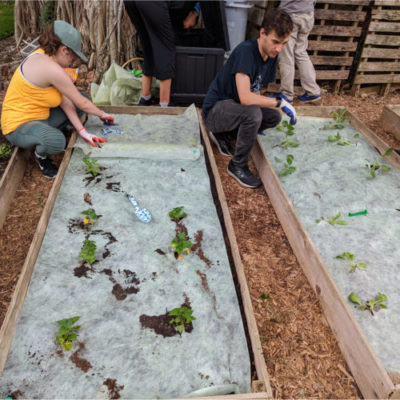
“The garden became our shared ‘toddler’ on campus,” joked Mamdouh. “Between the three of us, we rotate watering, covering the garden in tarps to prevent weeds and shop for new seeds, seedlings, soil, manure and labeling stakes.”
It became a community effort among Stetson Law’s eco-conscious students. Other Food Law Society members assisted in de-weeding and replanting each month. One even brought used coffee grounds from the café where she works to use in the fertilizer.
“With the effort we all put in, we share in the literal fruits of our labor but also in the failed attempts that educate us in the dos and do-nots of gardening,” Mamdouh said.
The January harvest yielded produce for all members of the Stetson Law Community to enjoy at no cost. As a shaded green space open to all, the garden is also a great place to de-stress from the rigors of law school.
“Someone can enjoy fresh produce from the garden, or destress with a garden cleanup event, or even sit among the plants under the banyan tree,” Chowdhury said. “Moreover, the garden demonstrates gratitude. Seeing where food comes from and the work needed is a humbling experience.”
Digging deeper: Cultivating conversations around food
There are, of course, much bigger-picture aspects to the undertaking.
For one, economic conditions and broader food policy in the U.S. can result in limited access to nutritionally dense foods in many communities – including, potentially, at Stetson Law.
“We realized while many schools offer food, there is a deficiency of nutrients – especially for any students who were food insecure because of finances or otherwise,” Burton said.
The group also hopes the project will help individuals think more critically about what it means to “eat local,” given how the current federal-government definition of “local” may cause consumers to buy produce that’s not as sustainably farmed as they think.
“We also realized that in 2022 the transportation and display system of in-store foods when the [United States Department of Agriculture] considered ‘local’ to be within 400 miles or less of product origin introduced spoilage and some nutrient degradation compared to truly local foods,” Burton said. “We hope the garden does draw community education about the localization of foods and the importance of nutrition.”
Keeping it growing
As 3Ls, law school is drawing near its close for Mamdouh and Burton – but the garden will live on. As incoming president of the Food Law Society, Chowdhury will take the reins – and he’s got big plans.
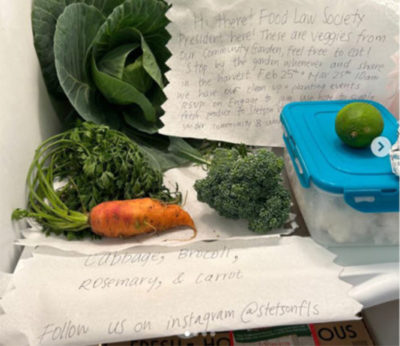
He said he hopes to foster more food justice initiatives, from encouraging students to volunteer at local food banks to creating “an educational space where students can learn about Food Justice issues, such as food deserts, legislative hurdles, and the socio-economic determinants for nutrition in our community,” he said.
That will likely include informative signage in the garden itself as well as walking paths to help invite others to explore the connection between local food and global sustainability. “I’m relieved to graduate knowing we have set solid building blocks for the Stetson Community Garden to further flourish in the upcoming years and I hope it becomes a Stetson landmark,” Mamdouh said.
-Kate Bradshaw
[email protected] | 727-430-1580


